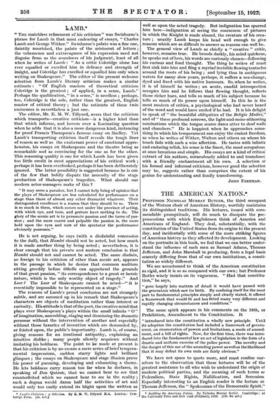THE AMERICAN NATION.*
PROFESSOR NICHOLAS MURRAY BUTLER, the third occupant of the Watson chair of American History, worthily maintains its distinguished traditions. His lectures, issued with com- mendable promptitude, will do much to dissipate the pre- possessions with which Englishmen think of America and Americans of England. They deal, substantially, with the constitution of the United States from its origins to the present day, and incidentally with some of the more striking figures of American history as they affected its development. Looking on the portraits in this book, we feel that we can better under- stand the influence of such men as Samuel Adams, Thomas Jefferson, and John Marshall in producing, from a legal basis scarcely differing from that of our own institutions, a consti- tution so widely different.
We are accustomed to think of the American constitution as rigid, and it is so as compared with our own ; but Professor Butler wisely insists on its vagueness. "Had that constitu- tion," he says,
"gone largely into matters of detail it would have passed with the generation which saw its birth. By confining itself for the most part to fundamental principles simply and clearly stated, it offered a framework that would fit and has fitted many very different and rapidly changing circumstances and conditions."
The same spirit appears in his comments on the 18th, or
Prohibition, Amendment to the Constitution. It •
" introduced into the constitution a wholly new principle. Until its adoption the constitution had included a framework of govern- ment, an enumeration of powers and limitations, a mode of amend- ment, and a bill of rights. Now, for the first time, there was intro- duced into the fundamental law an act of legislation in the form of a drastic and uniform exercise of the police power. The novelty and the danger of this use of the amending power as well as the likelihood that it may defeat its own ends are fairly obvious."
We have not space to quote more, and must confine our- selves to the observation that these lectures will be of the greatest assistance to all who wish to understand the origin of modern political parties, and the meaning of such terms as Federalism, State Rights, Nullification, and Secession.• Especially interesting to an English reader is the lecture on Thomas Jefferson, the" Spokesman of the Democratic Spirit."
• Lamb's Criticism : z Selection. By E. M. W, Tillyard MA, London : Cam- • Building the American Nation. By Nicholas Murray Butler. Cambridge : at


































 Previous page
Previous page